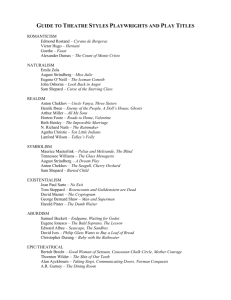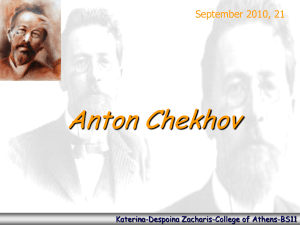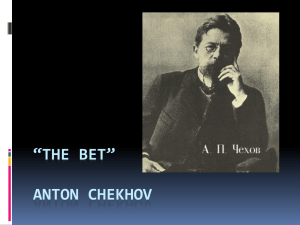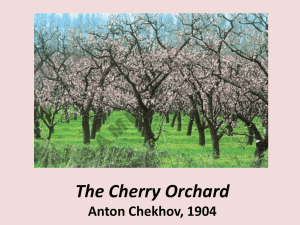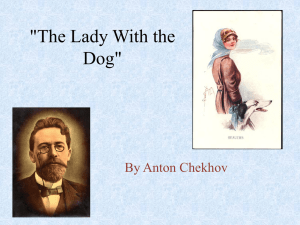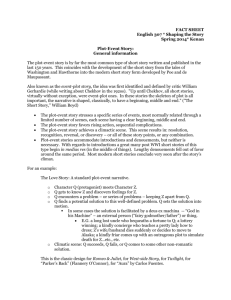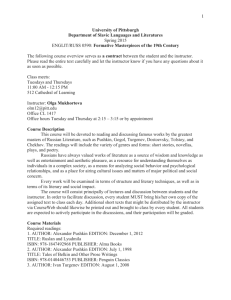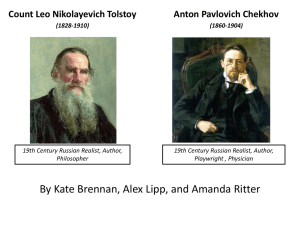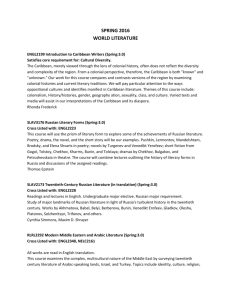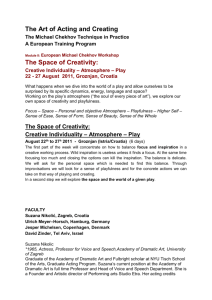Anton Chekhov and the End of the Century
advertisement
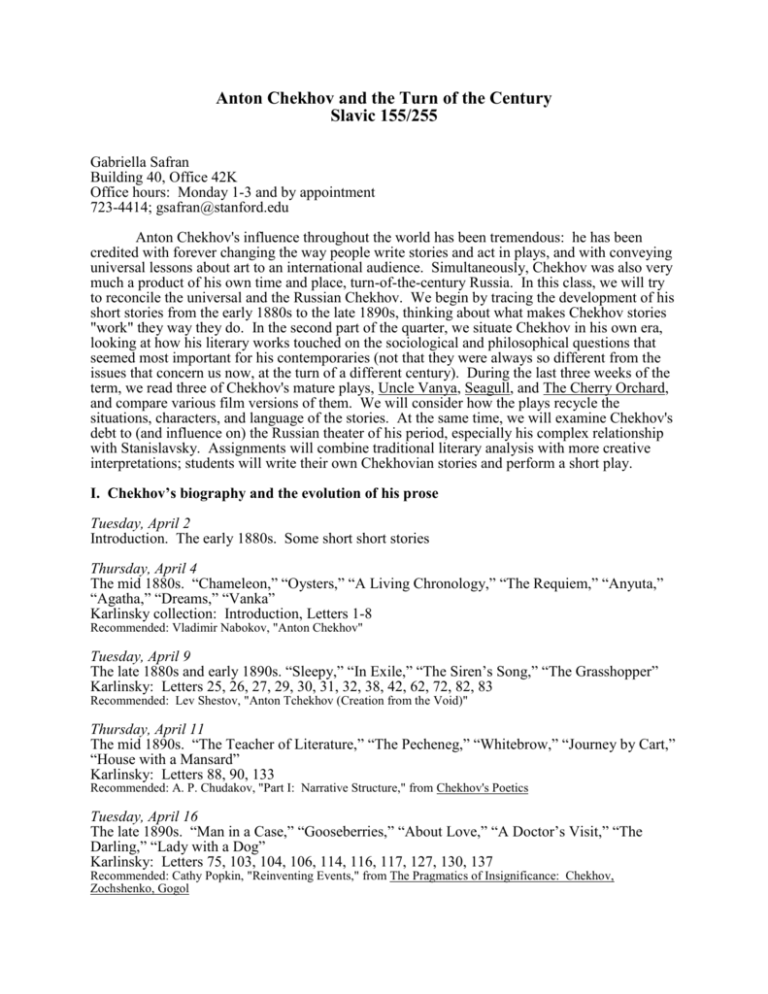
Anton Chekhov and the Turn of the Century Slavic 155/255 Gabriella Safran Building 40, Office 42K Office hours: Monday 1-3 and by appointment 723-4414; gsafran@stanford.edu Anton Chekhov's influence throughout the world has been tremendous: he has been credited with forever changing the way people write stories and act in plays, and with conveying universal lessons about art to an international audience. Simultaneously, Chekhov was also very much a product of his own time and place, turn-of-the-century Russia. In this class, we will try to reconcile the universal and the Russian Chekhov. We begin by tracing the development of his short stories from the early 1880s to the late 1890s, thinking about what makes Chekhov stories "work" they way they do. In the second part of the quarter, we situate Chekhov in his own era, looking at how his literary works touched on the sociological and philosophical questions that seemed most important for his contemporaries (not that they were always so different from the issues that concern us now, at the turn of a different century). During the last three weeks of the term, we read three of Chekhov's mature plays, Uncle Vanya, Seagull, and The Cherry Orchard, and compare various film versions of them. We will consider how the plays recycle the situations, characters, and language of the stories. At the same time, we will examine Chekhov's debt to (and influence on) the Russian theater of his period, especially his complex relationship with Stanislavsky. Assignments will combine traditional literary analysis with more creative interpretations; students will write their own Chekhovian stories and perform a short play. I. Chekhov’s biography and the evolution of his prose Tuesday, April 2 Introduction. The early 1880s. Some short short stories Thursday, April 4 The mid 1880s. “Chameleon,” “Oysters,” “A Living Chronology,” “The Requiem,” “Anyuta,” “Agatha,” “Dreams,” “Vanka” Karlinsky collection: Introduction, Letters 1-8 Recommended: Vladimir Nabokov, "Anton Chekhov" Tuesday, April 9 The late 1880s and early 1890s. “Sleepy,” “In Exile,” “The Siren’s Song,” “The Grasshopper” Karlinsky: Letters 25, 26, 27, 29, 30, 31, 32, 38, 42, 62, 72, 82, 83 Recommended: Lev Shestov, "Anton Tchekhov (Creation from the Void)" Thursday, April 11 The mid 1890s. “The Teacher of Literature,” “The Pecheneg,” “Whitebrow,” “Journey by Cart,” “House with a Mansard” Karlinsky: Letters 88, 90, 133 Recommended: A. P. Chudakov, "Part I: Narrative Structure," from Chekhov's Poetics Tuesday, April 16 The late 1890s. “Man in a Case,” “Gooseberries,” “About Love,” “A Doctor’s Visit,” “The Darling,” “Lady with a Dog” Karlinsky: Letters 75, 103, 104, 106, 114, 116, 117, 127, 130, 137 Recommended: Cathy Popkin, "Reinventing Events," from The Pragmatics of Insignificance: Chekhov, Zochshenko, Gogol II. Chekhov’s themes Thursday, April 18 Childhood. “Grisha,” “At Home” (Norton), “The Steppe” Karlinsky: Letters 16-19 Recommended: Lev Tolstoy, selections from Childhood Sunday, April 21, 11:00 a.m. Chekhovian story (750 words or less) and commentary (about 250 words) due by 11:00 a.m. to me at my house in Mountain View, where students are invited for brunch and a discussion of the difficulties of writing like Chekhov Tuesday, April 23 Marriage and infidelity. “The Huntsman, “ “Anna on the Neck,” “The Betrothed” (Norton), “Ionych” Karlinsky: Letters 28, 61 Lev Tolstoy, "The Kreutzer Sonata" Thursday, April 25 Sex and prostitution. “The Chorus Girl,” “A Gentleman Friend” (Norton), “An Attack of Nerves” Karlinsky: Letters 9, 24, 91 Tuesday, April 30 Death. “A Boring Story,” “Gusev” Karlinsky: Letters 38, 44-49, 78 Recommended: Tolstoy, “The Death of Ivan Ilych” Thursday, May 2 Medicine and disease. “Ward #6,” “The Name-Day Party” Karlinsky: Letters 22, 26 Recommended: Vsevolod Garshin, “The Red Flower” Tuesday, May 7 Russian Orthodoxy. “The Student,” “The Bishop” (Norton), “Holy Night” Karlinsky: Letters 27, 68, 134, 165 Recommended: Nikolai Leskov, “The Sealed Angel,” and Karlinsky, letter 3 Thursday, May 9 The Jewish Question “The Mire,” "A Rolling Stone," “Rothschild’s Fiddle” (Norton edition) Friday, May 10: 4-5 page paper on an assigned topic due to my box in the Slavic Department by 5:00 pm. III. Chekhov’s drama (and its interpreters) Tuesday, May 14 The Seagull Karlinsky: pp. 280-289, 323-326, 357-359 Thursday, May16 Uncle Vanya Recommended: Gary Saul Morson, "Uncle Vanya as Prosaic Melodrama" film screening at 7:00 pm (Vanya on 42nd St.) in the Slavic Department library (the film is also on reserve in the library) Tuesday, May 21 Vanya on 42nd St. Recommended: David Allen, Stanislavsky For Beginners, pp. 1-91 Thursday, May 23 Three Sisters Tuesday, May 28 Cherry Orchard Karlinsky: Chapter 15 introduction, letters 166, 177, 178, 180 Recommended: Maxim Gorky, "A. P. Chekhov" Thursday, May 30 Excerpts from various films of Chekhov plays will be shown in class. Andrey Bely, "The Cherry Orchard," Vsevolod Meyerhold, "Naturalistic Theater and Theater of Mood" Tuesday, June 4 Discussion of final papers/projects Thursday, June 6 Student production of one of Chekhov's funny one-acts Monday, June 10: Final paper (5-6 pp or 10-12 pp) or project (if you want to do a project instead of a paper, talk to me) due to my box in the Slavic Department by 5:00 pm Requirements and grading • Careful reading, thoughtful participation in class and possibly in leading discussion, and at least eight of the weekly submissions to the class forum site: 30% • Chekhovian story: 20% • 4-5 page paper on an assigned topic: 20% • 5-6 page final paper/project: 30% • Graduate students in literature are expected to do all the recommended reading and write a longer final paper (10-12 pages) that reflects outside reading, rather than the two shorter papers. Other students may also opt for this alternative with the permission of the professor. • Slavic graduate students will be expected to read one work per week in Russian and discuss them at a weekly section, beginning the second week of class. Others who want to join in are welcome. The Russian section will not meet the first or last weeks. Materials • The Norton edition of Chekhov stories, a reader with additional stories, the Karlinsky edition of his letters, a collection of Tolstoy novellas, and an edition of plays are available at the Stanford Bookstore. • A Russian edition of the plays with helpful English notes is available at the Stanford Bookstore for anyone who wants to try reading them in Russian (if not now, maybe later – but I encourage you to get this good edition while it is still in print). • If you're interested, a Russian edition of some stories is available at Szwede Slavic Books, 1629 Main Street in Redwood City. (Go north on El Camino, under the overpass at Woodside Road, turn right on Main Street and you'll see the store on your right. Ask Vera to get the book for you from behind the counter.) • Recommended readings that are not in the reader will be handed out liberally in class (with the exception of the Tolstoy novellas and Stanislavsky for Beginners, which will be at the Stanford Bookstore). • Slavic graduate students are expected to use the Russian version of the stories from the 1974 complete collected works in the library (the blue edition); their final papers should demonstrate that they have learned to use the scholarly apparatus in this edition.
